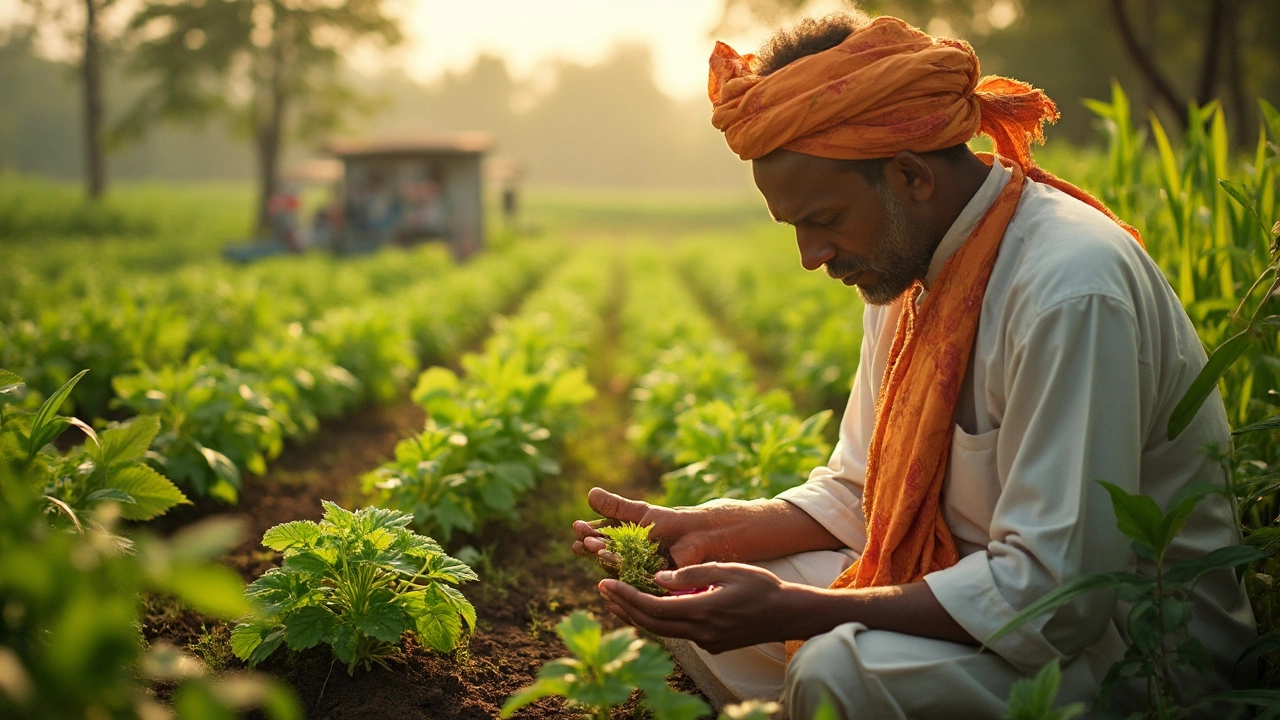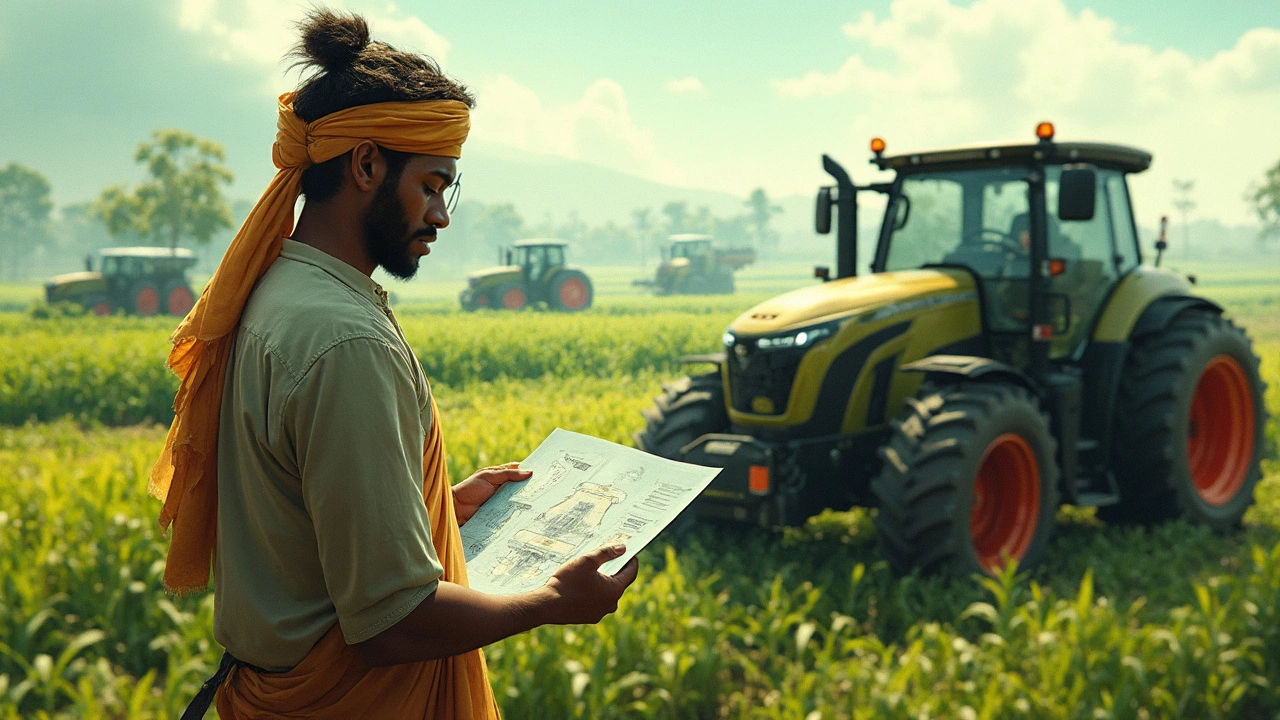Did you know that agriculture isn't just about growing crops and raising animals? It's a huge field with roles that need some seriously smart and skilled people. Let's talk about two key jobs that aren't your usual farm gigs: Agricultural Engineers and Soil Scientists.
Agricultural Engineers are like the tech wizards of farming. They mix mechanical know-how with agricultural needs to design and build equipment, systems, and structures, making farming more efficient and sustainable. Imagine them as the masterminds behind the machines that plant seeds and harvest crops, all with maximum efficiency.
- Understanding Specialized Agricultural Roles
- The Role of Agricultural Engineers
- Key Skills for Agricultural Engineers
- Soil Scientists: Guardians of the Earth
- Essential Qualities for Soil Scientists
- Conclusion: Embracing Specialized Agricultural Careers
Understanding Specialized Agricultural Roles
When we think of agriculture, images of wide-open fields and farmers tilling the land might pop into our minds. But there's a whole lot more to it than meets the eye. Modern agriculture is packed with complexity and requires a lot of know-how to keep things running smoothly. It's not just about planting and harvesting; there are specialized roles involving technology, science, and innovation to boost productivity and sustainability.
Two standout specialized jobs are Agricultural Engineers and Soil Scientists. They've got some pretty critical roles in the agricultural sector, helping to solve problems and improve efficiency. Agricultural Engineers are at the forefront of designing and developing machinery and equipment that get more done with less. They're the brain behind automated tractors and irrigation systems that make farming operations slicker.
On the other hand, Soil Scientists delve into the very foundation of farming: the soil. These experts study soil properties and come up with ways to improve soil health. Why's that important? Because healthy soil means better crops, which equals more food and better economic outcomes. They analyze soil composition and chemistry to help farmers tackle soil erosion, nutrient deficiencies, and contamination.
| Role | Key Responsibilities |
|---|---|
| Agricultural Engineer | Design farming equipment, develop solutions for automation, enhance irrigation systems |
| Soil Scientist | Study soil properties, improve soil health, address erosion and fertility issues |
By understanding these specialized roles better, we can appreciate the hard work and dedication that goes into making our food systems more efficient and environmentally friendly. It's jobs like these that help keep the wheels of modern agriculture turning.
The Role of Agricultural Engineers
Agricultural Engineers are like the tech gurus of the farming world. These smart folks master both Agriculture and engineering principles to help farmers increase production while reducing costs. They tackle a wide range of challenges, from designing tractors and other farm machinery to developing renewable energy systems that make farms more sustainable.
One of their coolest tasks is improving irrigation systems. You know how important water is to crops, right? Well, these engineers create more efficient ways to deliver water, helping farmers save water and money. Plus, they look for innovative ways to use rainwater or even treated wastewater.
Then there's the design of agricultural structures. Ever thought about those big silos or chicken coops? Agricultural engineers make sure these buildings can withstand harsh weather and house livestock comfortably. They think about ventilation, temperature, and even lighting.
Let's not forget technology integration. Drones and sensors in agriculture are a big deal now. Engineers figure out how to use these gadgets for monitoring crop health, checking soil conditions, and even automating tasks like planting and spraying.
By blending technology with traditional farming practices, Agricultural Engineers play a crucial role in keeping farms running smoothly and effectively. They're a vital part of our journey toward sustainable food production.
Key Skills for Agricultural Engineers
So, you want to become an agricultural engineer? Let's break down what you've gotta bring to the table. This job isn’t just about knowing your way around the farm, but also about getting hands-on with tech and research to make farming smarter.
First up, having a strong grasp of engineering principles is a must. We're talking about stuff like thermodynamics, fluid mechanics, and structural analysis. These will help you design systems that get the job done without breaking a sweat.
Next, tech-savviness is a big deal. Agricultural engineers often work with sophisticated tools and machines. Whether it's about designing advanced irrigation systems or developing automated machinery, you'll need to understand how these technologies work and how they can be improved.
Problem-solving is another crucial skill. You’ll find yourself inventing new ways to tackle issues like how to use less water in drought-prone areas or designing machines that can handle different types of soil. Think of it as being a creative thinker with a toolbox full of engineering tricks.
Communication skills shouldn’t be underestimated either. Whether you're explaining technical designs to a team of farmers or discussing project feasibility with corporate sponsors, being able to communicate clearly makes a world of difference.
- Understanding and applying engineering concepts
- Proficiency with technology and tools
- Strong problem-solving abilities
- Effective communication skills
- Knowledge of sustainable agricultural practices
Finally, being well-versed in sustainable agricultural practices is important. Knowing how to make farming more eco-friendly not only boosts your role’s value but also helps in contributing to long-term environmental sustainability.

Soil Scientists: Guardians of the Earth
Soil Scientists are like the detectives of the agricultural world, digging into the mysteries hidden beneath our feet. They're on a mission to understand soil's complex nature and help improve it. Healthy soil is vital for growing crops, so these experts play a big part in the food supply chain.
One of their main tasks is analyzing soil samples to determine the different nutrients and minerals present. This helps farmers know what kind of crops will thrive on their land and what fertilizers to use for better yield. Ever wonder why some crops grow better in some areas than others? That's often due to what Soil Scientists discover.
Another major part of their role involves developing strategies to battle soil erosion and degradation. Practices like crop rotation and cover cropping often come from their research, aimed at maintaining soil health. They offer advice to farm managers on how to treat different soil issues, ensuring the land remains productive year after year.
More than just dirt experts, they're also environmental champions. With climate change shifting the agricultural landscape, Soil Scientists look for sustainable farming practices that reduce environmental impact while boosting productivity.
Their work doesn't just revolve around being outdoors. They spend equally significant time in labs, using high-tech equipment to test and document soil properties. This data is crucial for creating models predicting how soil will respond to various agricultural practices and climate conditions.
| Role | Key Tasks |
|---|---|
| Analysis | Examining soil samples for composition |
| Strategy Development | Creating plans to combat erosion and degradation |
| Environmental Impact | Researching sustainable farming practices |
For those seeking a career that merges science and environmental stewardship, becoming a Soil Scientist is a rewarding path. Not only do they help grow food, but they also make sure the land is used responsibly, paving the way for future generations to benefit from our agricultural systems.
Essential Qualities for Soil Scientists
So, what makes someone a top-notch soil scientist? Well, it's more than just being comfortable with dirt. This job demands a mix of skills and qualities that help these experts understand and work with one of our planet's most indispensable resources.
First and foremost, a strong foundation in science, especially agricultural science, is crucial. Soil scientists need to know their chemistry, biology, and geology to analyze soil correctly. This isn't just textbook stuff—it's about using this knowledge to tackle real-world problems, like soil erosion or contamination.
Critical thinking and problem-solving skills are right up there on the list. Soil conditions are never the same from one spot to another, and solving the puzzles they present can be quite the brain workout. It involves figuring out what the soil needs to improve productivity and reduce environmental impact.
Communication skills are a biggie too. Soil scientists often work with farmers, agricultural engineers, and government agencies. They must explain complex findings in simple terms and suggest practical solutions for improving soil health.
Curiosity and attention to detail also play a key role. A good soil scientist needs to be like a detective, looking for clues in the soil's texture, nutrient levels, and organic content to determine its health and fertility. Missing out on small details can lead to big problems down the line.
Finally, let's not forget tech-savvy skills. Many soil scientists use high-tech tools and software for soil analysis and modeling, so being comfortable with the latest technology can set someone apart in this field.
Conclusion: Embracing Specialized Agricultural Careers
Jumping into specialized careers in agriculture can be super rewarding. It's not just about the paycheck; it's about making a real difference in food production and sustainability. Whether you're into tech or environmental science, these roles provide some pretty cool opportunities to innovate and tackle global challenges.
Take it from Dr. Ramesh Jain, a leading expert in agricultural sciences:
"With the rapid evolution of technology in agriculture, roles like Agricultural Engineers and Soil Scientists don't just meet today's demands but lay the groundwork for a more sustainable tomorrow."
So, what kind of impact can you have? Well, by becoming an Agricultural Engineer, you're directly boosting farming efficiency and reducing waste. On the other hand, as a Soil Scientist, you're literally ensuring the ground beneath our feet is healthy and productive — quite a vital responsibility, right?
Here are a few reasons why diving into these specialized roles might be your best career move:
- Career Stability: With ongoing agricultural development and innovation, experts in these fields are in high demand.
- Global Relevance: Feeding a growing population sustainably is a global challenge, and your skills are key.
- Impactful Work: You're not just working a 9-to-5; you're contributing to how the entire planet feeds itself.
Consider the numbers: A recent study highlighted that demand for Agricultural Engineers is expected to grow by 5% over the next 6 years — not a massive leap, but steady growth indicates lasting importance.
If you're passionate about sustainability and technology, these specialized careers in agriculture might be right up your alley. So why not take the plunge and transform your passion into a career that truly matters?
